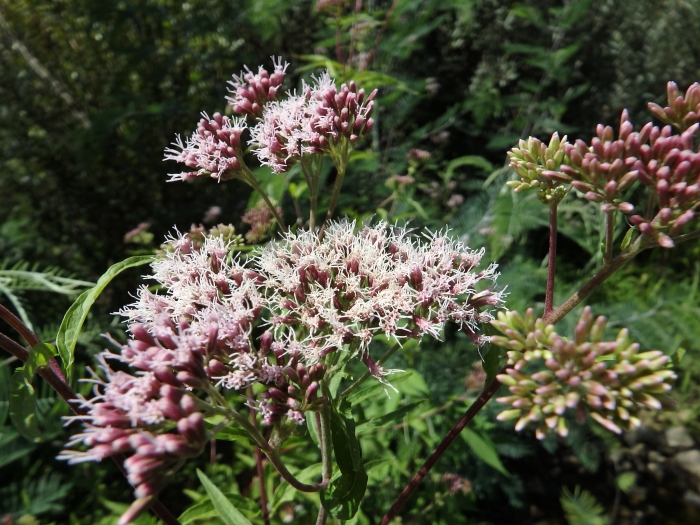Hemp-Agrimony
(Eupatorium cannabinum)
Hemp-Agrimony (Eupatorium cannabinum)
/
/

Duarte Frade
CC BY 4.0
Image By:
Duarte Frade
Recorded By:
Copyright:
CC BY 4.0
Copyright Notice:
Photo by: Duarte Frade | License Type: CC BY 4.0 | License URL: http://creativecommons.org/licenses/by/4.0/ | Rights Holder: Duarte Frade | Publisher: iNaturalist | Date Created: 2014-08-13T14:46:38-07:00 |





















Estimated Native Range
Summary
Eupatorium cannabinum, commonly known as hemp-agrimony or holy rope, is a robust perennial herb native to a range of habitats including riverbanks, damp woodlands, and wet meadows across Europe, Northwest Africa, Turkey, Syria, Iran, Iraq, Jordan, the Caucasus, and Central Asia. It typically grows up to 5 feet tall and 4 feet wide, featuring dark red or purplish stems that are covered in fine hairs. The plant is characterized by its lance-shaped, serrated leaves and clusters of tiny, mauve flower heads that form dense, flat-topped racemes. These flowers are highly attractive to pollinators and bloom from July to early September, adding a splash of color to the garden during late summer.
Hemp-agrimony is valued for its ornamental qualities, particularly its showy flower heads that can bring a wildflower meadow aesthetic to garden settings. It is often used in naturalistic plantings, borders, and wildlife gardens, where its nectar-rich flowers attract bees and butterflies. This plant prefers consistently moist soil and full sun to partial shade. It is relatively low-maintenance but may require staking in very rich soils or windy sites. While it has medicinal uses, caution is advised due to the presence of tumorigenic pyrrolizidine alkaloids. In cultivation, it can spread by rhizomes and self-seeding, potentially becoming aggressive if not managed.CC BY-SA 4.0
Hemp-agrimony is valued for its ornamental qualities, particularly its showy flower heads that can bring a wildflower meadow aesthetic to garden settings. It is often used in naturalistic plantings, borders, and wildlife gardens, where its nectar-rich flowers attract bees and butterflies. This plant prefers consistently moist soil and full sun to partial shade. It is relatively low-maintenance but may require staking in very rich soils or windy sites. While it has medicinal uses, caution is advised due to the presence of tumorigenic pyrrolizidine alkaloids. In cultivation, it can spread by rhizomes and self-seeding, potentially becoming aggressive if not managed.CC BY-SA 4.0
Plant Description
- Plant Type: Herb
- Height: 3-5 feet
- Width: 1.5-2.5 feet
- Growth Rate: Moderate
- Flower Color: Pink, Purple
- Flowering Season: Summer, Fall
- Leaf Retention: Deciduous
Growth Requirements
- Sun: Full Sun
- Water: Medium
- Drainage: Medium
Common Uses
Bird Garden, Butterfly Garden, Low Maintenance, Water Garden
Natural Habitat
Riverbanks, damp woodlands, and wet meadows
Other Names
Common Names: Raspberries and Cream, Holy Rope, Koninginnenkruid, St John’s Herb
Scientific Names: , Eupatorium cannabinum, Chrone heterophylla, Eupatorium lindleyanum, Eupatorium mairei var. mairei,
GBIF Accepted Name: